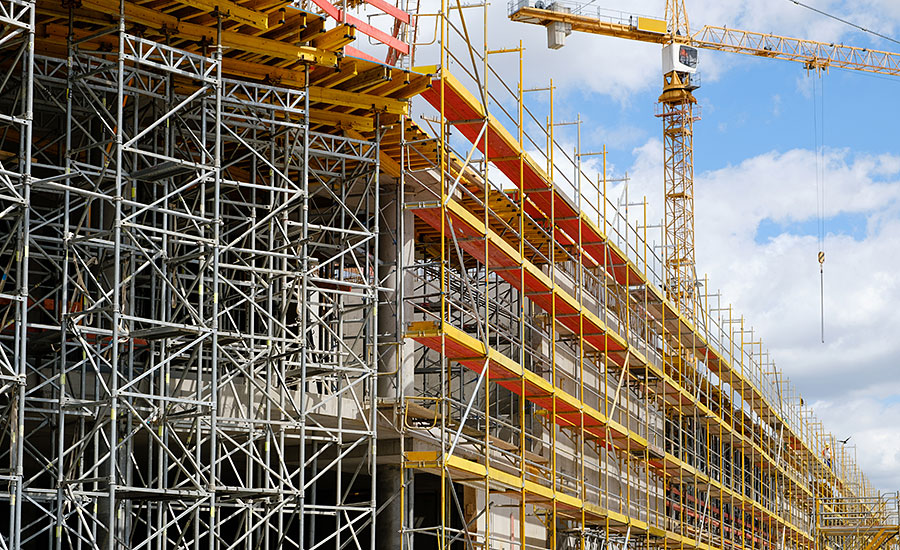Local Scaffolding Company Providing Reliable Services Throughout Surrey
Local Scaffolding Company Providing Reliable Services Throughout Surrey
Blog Article
Checking Out the Numerous Kinds Of Scaffolding Made Use Of in Construction Jobs
The construction industry counts heavily on numerous types of scaffolding to satisfy particular project requirements, each offering distinct benefits and applications. Typical framework scaffolding supplies a tough foundation for basic jobs, while put on hold scaffolding is necessary for job on high-rise structures.

Standard Framework Scaffolding
Traditional structure scaffolding is just one of one of the most commonly utilized methods in the building market due to its effectiveness and flexibility. This system contains horizontal and vertical frameworks that are set up to develop a stable platform for materials and employees. The primary parts consist of vertical messages, horizontal ledgers, and diagonal braces, which together provide a solid structure that can support significant lots.
One of the crucial benefits of traditional frame scaffolding is its versatility to various building and construction tasks, varying from property buildings to large business structures. The modular style enables simple assembly and disassembly, making it reliable for both long-term and temporary tasks. Additionally, the system can be personalized in height and width, suiting different building styles and site conditions.
Safety is vital in scaffolding applications, and traditional framework systems are equipped with guardrails and toe boards to stop drops and make sure employee defense. Normal inspections and adherence to security regulations are important in keeping the honesty of the scaffold (Scaffolding). On the whole, typical framework scaffolding remains a fundamental option in the building and construction industry, giving a dependable platform for labor and boosting total project efficiency

Suspended Scaffolding
Put on hold scaffolding supplies an unique solution for construction tasks that require accessibility to raised surface areas, specifically in situations where typical structure scaffolding may be impractical. This sort of scaffolding is usually suspended from the roof covering or upper levels of a structure, using a system of ropes, platforms, and pulleys to produce a functioning room that can be changed to different elevations.
One of the key benefits of put on hold scaffolding is its flexibility. It can be easily rearranged or decreased to accommodate modifications in building and construction requirements, making it optimal for jobs such as home window setup, façade work, and maintenance on skyscraper buildings. Additionally, the marginal footprint of put on hold scaffolding enables much better usage of ground room in city settings, where area is frequently restricted.
Safety and security is an essential consideration in the use of suspended scaffolding. On the whole, suspended scaffolding offers a reliable and effective remedy for accessing hard-to-reach locations in various construction situations, enhancing both performance and security on site.
System Scaffolding
System scaffolding, usually concerned as a modern remedy in the scaffolding market, contains pre-engineered components that can be rapidly constructed and adjusted for numerous building tasks. Scaffolding. This sort of scaffolding is identified by its modular layout, which allows for convenience and performance on work websites, suiting different heights and architectural demands
Commonly made from high-strength steel or light weight aluminum, system scaffolding provides enhanced toughness and stability. The elements include vertical articles, horizontal ledgers, and diagonal dental braces, which adjoin firmly, making sure a durable structure. The layout often incorporates standard installations, simplifying assembly and disassembly procedures, thereby decreasing labor time and prices.

Rolling Scaffolding
Moving scaffolding is a versatile choice to conventional set scaffolding, made for movement and simplicity of usage on building and construction websites. This kind of scaffolding consists of a system sustained by frameworks with wheels, enabling employees to conveniently move it as required. The wheelchair feature significantly enhances performance, as it reduces downtime associated with dismantling and setting up fixed scaffolding.
Generally constructed from light-weight products such as light weight aluminum or steel, rolling scaffolding uses a sturdy yet mobile remedy for jobs requiring regular repositioning - Scaffolding. It is especially beneficial in jobs such as paint, drywall installation, and electric work, where accessibility to various heights and places is needed
Security is critical in rolling scaffolding layout, with functions such as locking wheels to stop unplanned activity when in usage, and guardrails to protect employees from drops. Additionally, numerous models are flexible in elevation, accommodating different job needs.
Cantilever Scaffolding

The design of cantilever scaffolding generally involves making use of arms or brackets anchored to a building or structure, enabling the system to prolong external safely. Safety and scaffolding stairs security is extremely important; thus, these scaffolds must be crafted to endure environmental problems and numerous tons. Regular assessment and maintenance are necessary to guarantee structural stability and worker safety and security.
Cantilever scaffolding is favored for its versatility and efficient use area, making it a preferred choice in urban environments where room restraints prevail. It promotes easier access to high altitudes, inevitably adding to the overall performance of building jobs. Just like all scaffolding types, correct training and adherence to security standards are crucial for workers utilizing cantilever scaffolding.
Verdict
To conclude, the diverse kinds of scaffolding used in building jobs each serve unique functions customized to details site demands. Standard frame scaffolding offers security, while put on hold scaffolding provides flexibility for elevated jobs. System scaffolding facilitates fast setting up, and rolling scaffolding enhances mobility for differing workplace. Cantilever scaffolding successfully deals with challenges in metropolitan setups. Understanding these scaffolding kinds is essential for maximizing safety and security and efficiency in construction, eventually adding to the effective completion of tasks.
Traditional framework scaffolding gives a sturdy structure have a peek at this website for general jobs, while put on hold scaffolding is crucial for job on skyscraper frameworks.Moving scaffolding is a functional choice to standard fixed scaffolding, made for wheelchair and ease of use on building sites. As with all scaffolding kinds, proper training and adherence to safety and security criteria are crucial for workers making use of cantilever scaffolding.
Conventional structure scaffolding gives security, while suspended scaffolding supplies convenience for raised tasks. System scaffolding facilitates quick setting up, and rolling scaffolding boosts movement for differing job environments.
Report this page